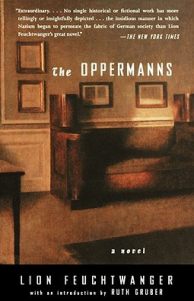

When Lion Feuchtwanger left Germany in 1933 for a trip to the UK and the US, he didn’t think that he would never return to his home country. While abroad, he said to people that “Hitler is over”. When Hitler then became Chancellor – Reichskanzler – in 1933, Feuchtwanger’s opinion changed considerably. “Hitler means war” he said to a journalist, a statement that was widely quoted in the American press. Soon after the Reichstags fire – Reichstagsbrand – Feuchtwanger’s house was searched, his possessions destroyed or confiscated. He knew he could never go back. The events shocked him, but what shocked him even more was that he, like so many other Jews and other Germans, had believed for so long that anything this barbarous would never be possible in the country of Goethe and Schiller. The realization of how wrong he was led him to write The Oppermanns, a book in which we find a lot of his own experience. What struck me, while reading this, was how prescient it seemed. I rechecked my edition twice, to see whether it was really published in 1933. Yet, Feuchtwanger was very had on himself for not having seen the whole thing coming sooner. I found that so interesting. I think we are so focused on the war that we tend to forget that Hitler’s ascent, his totalitarian regime, the horrors against the Jews, the communists and the intellectuals started so much earlier. Long before the war.
The Oppermanns tells the story of a rich Jewish family. There are three brothers and a sister. Martin is the head of the family company, a furniture house, Gustav who works with his brother, is also a publicist and does research on Lessing. Edgar, is a brilliant surgeon. The sister, Klara, stays in the background. It’s her American husband, Jacques Lavendel, who is another major character. Three of the Oppermanns have children. Martin’s son Berthold, Edgars’ daughter Ruth, and Klara’s son Heinrich.
There are many minor characters that are just as important. Teachers at Berthold’s and Heinrich’s school, people who work for the Oppermann’s in their furniture store and many more.
The story starts in 1932 with Gustav’s 50th birthday. It should have been a day of triumph but their company is in danger and this overshadows Gustav’s big day. Until now, Gustav wasn’t a political man. He was more interested in Germany’s culture, its literature and, like many, he believed that someone who produced something as badly written as Mein Kampf couldn’t be taken seriously. Surely, the Germans would see through this and shake it off. His brothers Martin and Edgar were slightly more aware of what was going on. The Nazi’s were gaining ground and Jewish businesses and Jewish people were more and more threatened. In order to save the furniture business, Martin suggests to collaborate with an Aryan business partner. That someone this rooted in tradition and family values would go this way, wakes up Gustav.
Edgar on his side is threatened to leave his hospital. Although he has invented a famous cure, the Nazis’ pretend he’s killing his Aryan patients.
The saddest stories focus on Berthold, whose new teacher is a fanatic Nazi and determined to humiliate Berthold, and the story of one of the Oppermanns’ employees who, like so many, is arrested and tortured.
Towards the end of the novel, after Hitler has become Chancellor, those Oppermanns, who survived, flee the country.
An omniscient narrator tells us the many stories, switching back and forth between the characters. A bit like in Irène Némirovsky’s Suite Française, we get the feeling of being there, of reading a documentary, but the result is a more traditional novel with a plot.
Feuchtwanger deplored later that he wrote this without taking a step back. He felt this documentary aspect was a weakness of the novel. I don’t agree with him. I think this is exactly the reason why this book is so outstanding. It’s the first novel in which the Nazis and their ascent is criticized, in which the manipulations, the lies, the atrocities, the confiscations, the torture, the concentration camps are described in detail.
What I found particularly fascinating is how Feuchtwanger explores the different reactions to the Nazi’s rise. Many, especially cultured people, just couldn’t believe that someone who wrote a book that was as badly written as Mein Kampf could become Chancellor. Others just didn’t take the movement seriously because they thought they wouldn’t get in the line of fire, either because they were from old, rich and influential families or because they thought they were not important enough. Others, especially religious Jews, were planning on leaving for Palestine. I often wondered why not more left but I had no clue that not everyone was allowed in. Only those who could pay a certain amount, which wasn’t possible for everyone.
Another interesting aspect is the difference between race and religion. Reading this book, one becomes fully ware, that it was never really about religion but about race. Most of the characters in this book, probably like Feuchtwanger himself, were not religious. And they certainly didn’t see themselves as belonging to another race. They felt they were Germans just like anyone else. Germans first and then Jewish. Not the other way around. In a way, you could say that this self-image clouded their perception. They didn’t identify with being Jewish and therefore didn’t feel threatened.
At the beginning of this post, I wrote how prescient this book felt. But that is the perception of someone who reads this now and the longer I think about it, the more I feel, Feuchtwanger wasn’t so much prescient as just aware. Reading this, I really wonder why not more people saw it coming.
The Oppermanns is a very readable, entertaining book. The characterisations are wonderful. Feuchtwanger brings even minor characters to life and makes the reader care for them. The strength of the book however lies in its immediacy and documentary character. Reading it, one feels transported in time. And, for the first time, I understood, not only how early it all began, but why people didn’t or couldn’t react the way they should have. Some embraced Nazism, but many just couldn’t believe it. Not even when they saw or heard about the atrocities. Only when they or their loved ones experienced them first-hand did it fully sink in.
If you’re interested in the rise of Nazism or like a well-told family story, then you shouldn’t miss this. It’s outstanding.
